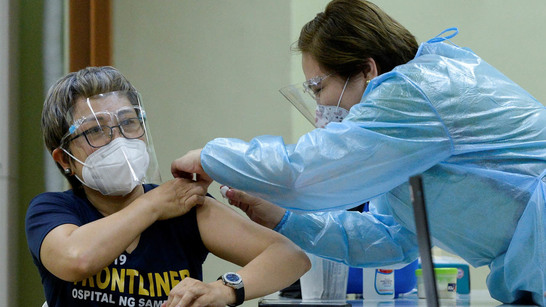Why people delay vaccines?
Vaccine Hesitancy
Interviewer: Emma Guo
Interviewed: Professor Greg Gray
With COVID-19 vaccines available on the market, pro-vaccine and anti-vaccine voices have both arisen and begun advocating loudly. With historical vaccine hesitancy and the tight timeline specific to this context, vaccine hesitancy might pose a threat to containing the pandemic and bringing normality back to our lives. More interestingly, we notice that there are people who might be regarded as very knowledgeable in this field, for example, biology professors and public health practitioners who appear reluctant about vaccines. For this issue, it’s our honor to invite Dr. Gregory Gray to share his professional insights on this topic.

Gregory C. Gray MD, MPH, FIDSA is an infectious disease epidemiologist, medical doctor, and Professor at Duke University, Duke-NUS School of Medicine, and Duke Kunshan University. He often studies respiratory viruses and leads the Duke One Health Network which involves more than 30 professionals studying more than 30 pathogens under 30 research and training projects running in multiple countries.
Emma: Hi Dr. Gray, as an infectious disease epidemiologist, you have also served on the review board for some vaccines. What do you think are potential reasons for some experts’, for example, biology professors or public health practitioner,’ hesitancy about COVID-19 vaccines?
Dr. Gray: We’ve had vaccine hesitancy ever since the late 1790s when Edward Jenner proposed using cowpox scrapings in skin inoculations to prevent smallpox in humans. Such vaccine hesitancy has occurred among both the highly educated and those with less training. Some vaccine hesitancy is healthy. It’s right to be questioning the safety and the effectiveness of a vaccine, particularly when it is produced in a new way and there are spare safety data. It is correct to discuss vaccine safety data in a public way. Is the vaccine safe? Is it associated with any unexpected acute or chronic manifestations? Is it immunogenic (will it simulate an immune response that protects the recipient and lasts a long time)?
I have recently served on the safety review board for one of Moderna’s messenger RNA COVID-19 vaccine trials and I have a lot of confidence in the way the U.S. Food and Drug Association reviews and approves vaccines. I am convinced we in the USA managed vaccine trials well, even in the midst of a pandemic when there is tremendous pressure on the government to rapidly approve vaccines. I would be hesitant to receive a novel COVID-19 vaccine like Moderna’s mRNA vaccine if the vaccine’s safety and immunogenicity data were not available. Even so, if a classically produced COVID-19 vaccine was available, say one that was grown in culture and inactivated and I had confidence in its production, I might still take that vaccine even if the safety and immunogenicity data were incomplete given that the COVID-19 can be very severe, and my personal risk is higher. I say this because I essentially do this every year in receiving the season influenza vaccine. This vaccine is annually prepared the same way by companies that are FDA-approved to produce it. However, they produce the vaccine each year often with different influenza virus components to match influenza A and B viruses that are circulating in our hemisphere. They don’t have time to safety test the vaccine in thousands of people each year so we trust the company to continue to produce the vaccine in the same way and assume it will be as safe as it was in previous years.
Emma: Thank you Professor Gray for your comprehensive answer that shows both sides’ opinions. Seeing this situation, in your opinion, how might it impact the public communication of the pandemic control?
Dr. Gray: In many democratic countries, we have groups of people who aggregate to rather polar opinions about vaccines. Most people are very supportive of vaccinations but some are not. While such freedom of speech is a good thing for a democracy like the USA sometimes the antivaccination groups have influenced enough people to avoid vaccines that it has caused us considerable harm, harm much in excess of the size of the antivaccination group. Sometimes it has led to severe disease and deaths that were totally preventable. For instance, during recent years in the USA we have suffered from such vaccine hesitancy in that serious illnesses which we had previously controlled have again taken hold among the unvaccinated. For instance epidemics of mumps virus infection have unnecessarily caused outbreaks of severe mumps disease. Hence, vaccine noncompliance can greatly damage the public’s health and once we know a vaccine is safe and effective, many criticize the noncompliant population as selfish and misinformed. We are going to need a high percentage of the world’s populations to receive effective vaccines to drive down the transmission rates of COVID-19, maybe as much as 80% of the populations to reach heard immunity. While we want to protect the personal freedom of people who are against vaccines, we need to strongly urge vaccine dissenters to reconsider as their views and decisions can impact others. That is being done effectively in some countries with strong positive and negative incentives.
Recently there have been discussions by scientists that perhaps we are not counting many subclinical COVID-19 infections and nearing herd immunity because we are beginning to see a decline in mew COVID cases both nationally and in various state such as North Carolina. We’re hopeful that the combination of vaccine receipts, isolate and quarantine, and social distancing will soon help us to bring this pandemic under control.
Emma: That’s definitely the direction we are all are hoping to see. As an expert, what’s your general suggestion for the public on COVID-19 vaccines?
Dr. Gray: I am strongly advocating that everyone who is eligible to receive a government- approved vaccine and do so as quickly as you can. We are seeing considerable efforts in the United States to reach out to the groups who are afraid of vaccines. We’re doing this through education programs, social media, and through the support of popular citizens who champion the vaccines, such as public officials, movie stars, and athletes. While we will have different vaccine types available in different countries, we hope that their broad use over the next six months in many countries with help us reduce this pandemic’s impact and SARS-COV-2 virus will become less of an emergent threat.
